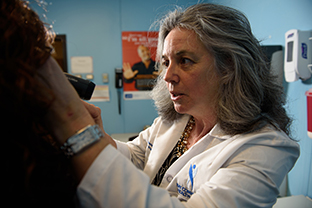April 2, 2020
As COVID-19 exacerbates challenges of opioid epidemic, SVSU-led initiative offers solutions to health care teams worldwide
 A Saginaw Valley State University-operated initiative is taking the lead — on a global scale — in providing expert solutions that support one of the populations left most vulnerable to COVID-19: people recovering from substance use disorders.
A Saginaw Valley State University-operated initiative is taking the lead — on a global scale — in providing expert solutions that support one of the populations left most vulnerable to COVID-19: people recovering from substance use disorders. The SVSU-organized Project ECHO beginning in October 2018 convened bi-weekly via teleconference, providing access for health care providers to a panel of substance use disorder experts from the Great Lakes Bay Region. When COVID-19 reached across all 50 states in March, attendance for the sessions more than doubled as social distancing measures and rising anxieties intensified the challenges already faced by substance use disorder recoverees. That group included the population already struggling through the nation's years-long opioid epidemic.
“Isolation is the enemy of a person with a substance use disorder,” said Kathleen Schachman, a Project ECHO organizer who serves as SVSU’s Harvey Randall Wickes Endowed Chair in Nursing.
“It’s only through connections that they are really able to embrace recovery, and when we cut those connections, it has really negative consequences. There is an increased risk for relapse or overdose. That’s our challenge as health care providers — to prevent that — and so we at Project ECHO want to keep these health care teams engaged with their patients.”
And, more and more, those health care teams are tuning in to the guidance provided during Project ECHO’s free bi-weekly sessions. One month ago, about 30 health care professionals on average attended each teleconference. During a Wednesday, April 1 virtual gathering, 70 people participated.
The panel of experts include a social worker, pharmacist, addictionologist, psychiatric mental health nurse practitioner, a peer recovery coach and members of SVSU’s College of Health & Human Services faculty. After the group leads with a prepared lecture on a specific topic during each meeting, the session concludes with participants asking questions and sharing their own experiences and best practices.
“We’re democratizing knowledge and expanding the workforce capacity by helping our primary care teams,” Schachman said.
Largely, the Project ECHO sessions are attended by primary care teams in rural regions of the state, where in-person visits are more challenging for patients who live far from health care facilities that specialize in substance use disorder. Since Project ECHO began two years ago, the session attendees have included health care workers from 45 of Michigan’s 83 counties; 22 of the 50 U.S. states; as well as representatives from Canada and Tanzania.
This Wednesday's teleconference session topic centered largely on a practice known as “telehealth,” which involves utilizing technology — including two-way audio/visual communication and mobile apps — to tend to patients as an alternative to visiting them in person. It’s a practice Schachman said will become particularly useful for treating substance abuse disorder while those individuals are isolated from help during the COVID-19 pandemic.
Schachman and her SVSU colleagues are experienced in fighting substance use disorder. She leads a number of university-backed initiatives that connect health care workers with individuals addicted to alcohol and opioids.
In collaboration with Bay County Health Department, SVSU in 2015 established the Bay Community Health Clinic in downtown Bay City. The primary care clinic utilizes an integrated approach — teaming professionals in nursing, occupational therapy, pharmacy and social work — to address physical and mental health issues on multiple fronts. Those professionals are supported by students who provide help while receiving hands-on training. The clinic’s opening correlated with the escalation of the national opioid epidemic, bringing many Bay County residents suffering from addiction into the clinic’s care.
With the support of nearly $6 million in U.S. Department of Health & Human Services grants, SVSU and Schachman established and expanded the clinic’s services.
That expansion included the founding in 2018 of the SVSU-based GRACE Project, which established a team at the clinic that specializes in addiction recovery for patients 60 and older.
More recently, the expansion included primary care support for patients unable to travel to the downtown site, instead utilizing telehealth practices to reach residents and caregivers in faraway rural communities. The Michigan Health Endowment Fund recently provided a grant funding the purchase of an important tool in telehealth — iPads — for patients and caregivers.
Project ECHO is one of the latest branches to sprout from the SVSU health and human services community outreach tree.
Health care professionals interested in participating in Project ECHO sessions can register for free at svsu.edu/echo. The next session is Wednesday, April 15.
The teleconferences are broadcast at noon on the first and third Wednesdays of each month via Zoom, an online program that connects users in a multi-screen platform for group meetings. Sessions typically last 90 minutes.
